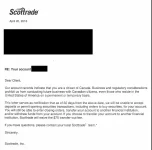Why are Brokerage Accounts Being Closed?
The global financial regulatory landscape is dramatically changing. FATCA imposes significant new compliance burdens on non-U.S. financial institutions with U.S. clients. As a result, many non-U.S. financial institutions now simply refuse to service U.S. persons. Unfortunately, U.S. financial institutions are following suit due to FATCA and other considerations. There have been stories about Morgan Stanley closing American expat accounts, Merrill Lynch placing restrictions on non-resident accounts, and other banks with similar new policies on expat accounts.
Among U.S. financial institutions, account restrictions differ between firms. Some firms are closing all accounts for non-U.S. residents; while other firms are only restrict services available to Americans not resident in the U.S. In other cases, firms require very high minimum account values for non-U.S residents who wish to remain clients. Bans on purchasing U.S. mutual funds by non-residents, including Americans citizens, are now the norm. These new restrictions affect bank accounts, brokerage accounts, and retirement accounts (IRAs and 401ks).
Many commentators attribute these actions to FATCA and increased offshore tax enforcement efforts. However, there are numerous contributing factors in addition to FATCA. Enhanced Treasury Department enforcement of existing anti-money laundering regulations and know-your-client rules, evolving interpretation of the 2003 Patriot Act, and new European regulation of cross-border investments all play a role. These factors contribute to a heightened compliance burden faced by financial institutions providing retail investment services across borders. Many U.S. institutions are following the lead of foreign banks in limiting perceived compliance and legal risk by simply refusing to provide retail financial services across borders.
The global financial regulatory landscape is dramatically changing. FATCA imposes significant new compliance burdens on non-U.S. financial institutions with U.S. clients. As a result, many non-U.S. financial institutions now simply refuse to service U.S. persons. Unfortunately, U.S. financial institutions are following suit due to FATCA and other considerations. There have been stories about Morgan Stanley closing American expat accounts, Merrill Lynch placing restrictions on non-resident accounts, and other banks with similar new policies on expat accounts.
Among U.S. financial institutions, account restrictions differ between firms. Some firms are closing all accounts for non-U.S. residents; while other firms are only restrict services available to Americans not resident in the U.S. In other cases, firms require very high minimum account values for non-U.S residents who wish to remain clients. Bans on purchasing U.S. mutual funds by non-residents, including Americans citizens, are now the norm. These new restrictions affect bank accounts, brokerage accounts, and retirement accounts (IRAs and 401ks).
Many commentators attribute these actions to FATCA and increased offshore tax enforcement efforts. However, there are numerous contributing factors in addition to FATCA. Enhanced Treasury Department enforcement of existing anti-money laundering regulations and know-your-client rules, evolving interpretation of the 2003 Patriot Act, and new European regulation of cross-border investments all play a role. These factors contribute to a heightened compliance burden faced by financial institutions providing retail investment services across borders. Many U.S. institutions are following the lead of foreign banks in limiting perceived compliance and legal risk by simply refusing to provide retail financial services across borders.

